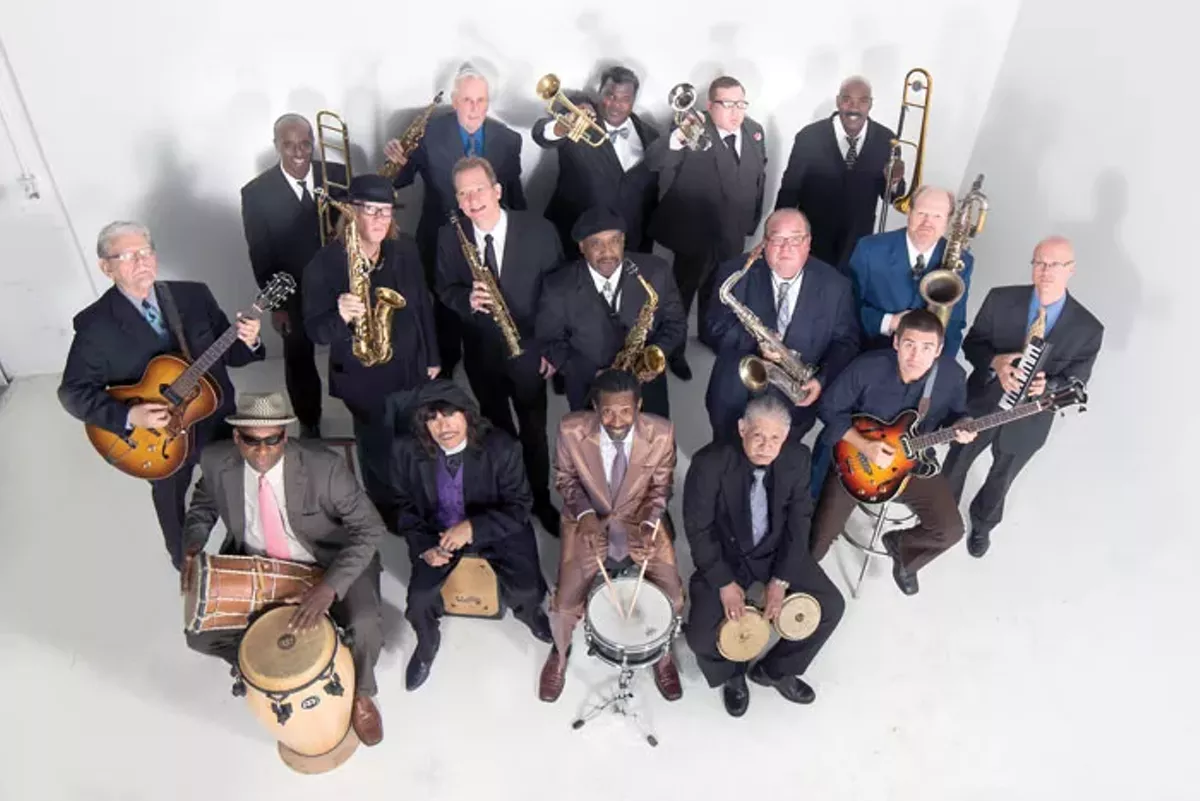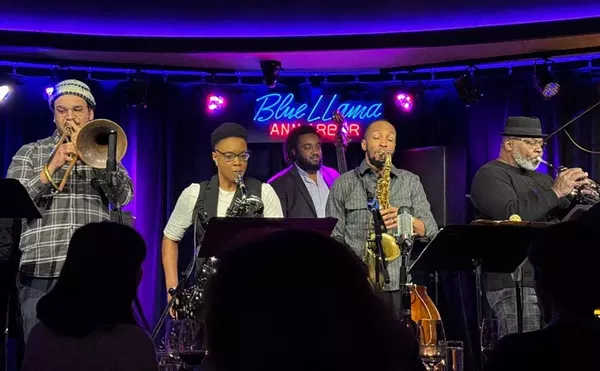Dr. Professor Leonard King Jr. is not only one of our most historically and culturally important figures, but he's one of Detroit's biggest musical personalities. The man is earnestly professorial in a way no one who actually slogs through academia ever really is. He's performed professionally since he was 12 years old, and led his own groups for more than 50 years.
When you discover that the "Doctor Professor" handle was bestowed upon the drummer, vocalist, bandleader, composer, and record label head by a former bandmate, and not any school, the label feels even more apt.
King is the leader of not only his own ensemble, the Dr. Professor Leonard King Orchestra, but the torch-bearer for supremely badass funk-jazz pioneers the Lyman Woodard Organization. Metro Times spoke with King on the occasion of a special edition of his every-other-monthly residency at Trinosophes, when he leads an expanded orchestral version of the group on Wednesday, March 9. This is a special annual treat, put on near Woodard's birthday. Because King is such a great raconteur, the interview is presented here in the "in his own words" format.
On first meeting Lyman Woodard:
During the mid-'60s, especially '66 or '67, you could not drive down the Lodge Freeway and miss their very name. There it was, in huge black letters with a white background, "Lyman Woodard Trio, Monday through Saturday, six nights a week." I was impressed with that. I had already been playing for six years at that time. And one day, riding past there, I decided, you know, I'm going to play with him one day. Now I didn't even know what Lyman looked like, and I had never heard his music. I didn't know a damn thing about Lyman, except that I was going to play with him.
And even now, as I'm sitting here, I shake my head. How could I know? To me, that's another great example about the human experience. There's just something about people that can't be explained. People might say that's pre-destiny, I don't know if that's what it is. I didn't meet him until about maybe the spring of '73 on a gig, with a bass player named Curtis Roland, and Lyman was beside me. Lyman was playing the Wurlitzer piano; he wasn't playing the oboe, you know. So that's how I met him. Then in August we performed at the Cotillion Club on Puritan, just north of Schaefer: Lyman on the Wurlitzer electric piano, Ron English on electric bass, and me. And four weeks after that gig, he called and said he wanted me to join his new trio. I had no idea.
On disbanding Leonard King and the Soul Messengers:
It was what I needed at that time, because that was the 10th year of the Soul Messengers, the last year of the Soul Messengers. I realized I couldn't get any more work for the band. By that time, we were an organ trio. And at that point in my life, I was still adjusting from being back from the army, getting back to civilian life, being back from Vietnam, you know, all of that. And on a personal level, I was alright before I left for Vietnam. I'm trying to figure out where to fit back in civilian life, and the only thing that made sense was music. Which was why I clinged to that so tenaciously, and musicians really became my family. No offense to my blood relatives, but that became my family. I could share things with them that I wouldn't say to certain family members, except my brother, Greg.
So when that happened in March of '73, that's when I thought, "OK, I need to let go of this band leading thing." When Lyman called, that was perfect. And the music, the compositions between Ron and Lyman, despite the experience that I had had up until then, all those years of playing — they were playing stuff that was really causing me to think. Being around them helped influence the way I write now. I wanted to be on par with them, compositionally speaking. Meeting Lyman and Ron English and being in the band with them was one of the best things that ever happened to me in life.
On Lyman Woodard's 1975 LP Saturday Night Special (Strata):
That was a very fruitful period in Detroit music. I wouldn't necessarily say that Saturday Night Special represents a certain pinnacle for jazz here because there was so much going on and a lot of the so-called jazz musicians over here don't consider that jazz. You know how that works! But Lyman had always had his finger on the pulse of the average working person. I'll put it like that, on people in general, because his stuff was always more dance-oriented. I see the dancers on the dance floor because all of us had experience, especially during those days; the musicians provided the music for dancers. I'm not down on DJs. The whole thing has flipped since then.
It's a beautiful thing when people are sitting down and digging what you're doing, and they're applauding. That's cool, really. That's zeroing in on what you're doing. But when they're dancing, and you got a sea of bodies moving at the same time anticipating every note that you play, and you're looking at them — now you've got a partnership. That was a partnership between the dancers and the musicians. That's one thing I miss now.
On being a working musician in the 1960s and '70s in Detroit:
You know that movie, that Kentucky Fried movie? The part where they're taking this guy, and they're like, "What punishment should we give him?" and they say, "Take him to Detroit." "Noooooo! Not Detroit." Now, when I found about the Detroit plan of 1946, it all makes sense. What we see here in this area economically and racially, is no accident. It was a plan (that was done) on purpose. The state of Michigan gave the city of Detroit eminent domain in 1948 to bulldoze any area under the pretense of eradicating urban blight. We still see that here. In neighborhoods, "tear it down, tear it down."
But when I think back on those days, when things were at their zenith economically speaking, your next door neighbor had money. Young people had money. In 1967 especially, because we were working every week, at a minimum in 1967 dollars, $300. Each guy in the band is making 300 bucks. You know what that equates to now, in 2016 dollars? That's like $2,550. That should be shit money.
On leaving the Lyman Woodard Organization (the first time):
I joined them in September of '73 and I left in October of '74. That was another valuable lesson there. Lyman would reach a certain point and then he would stop. I'm not going to say that all trust fund babies are like this, but Lyman knew he had a safety net. You know, financially speaking. He came from rich parents; he knew that he could go someplace and sit on his ass and it was all covered. So after a while, we were growing and growing like crazy as a group, and then we got stuck, musically speaking. We were playing the same songs nightly, night after night, and I found myself trying to come up with different things to do without destroying the basic premise of the song itself. Because whatever you do that's going to be different still gotta fit. It still gotta fit, it still has to make sense musically speaking.
It seemed like I was becoming redundant. So I said, "Lyman, look man. Let's start rehearsing again." "Nah, Leonard, we got enough songs." I started getting into arguments with Lyman, even though it was his band.
When I decided to leave, it was like, "Man, I need a breath of fresh air, I feel like I'm suffocating here." And when Norma Jean Bell joined, Lyman did not insist that she learn all of the songs. So when she joined, we lost half of our book, because he wouldn't call rehearsals so she could learn the material. The good lesson for me that came out of that was: I don't care what band I'm in, I'm always going to have my own, maybe more than one.
On rejoining the Lyman Woodard Organization:
So when Lyman asked me, by the time he put another band together, he called me at home one day, he said, "You gotta come down to Cobbs, man. I got this young kid, he's 16 and his name's Kenny Garrett and he's a bad motherfucker. You gotta hear this guy." I went down there, and the band was there. Ron Jackson, trumpet, Kenny Garrett, I think Leroy Emmanuel was the guitars, Lyman, and Melvin Davis. Melvin was the drummer. That band was undocumented. That was one band, around '77, somewhere in there. Then, let's see, '79 or so, he called me because he was putting another band together. Ron was held over and Allan Barnes came in. Kenny had left; Kenny graduated from Mackenzie High School and right after high school he joined Duke Ellington's Band. Ron Jackson, Alan Barnes, Robert Young, Lyman, and myself. We had been together a little bit before Lyman decided to do the recording, which eventually became Don't Stop the Groove. It was supposed to be two nights recording, but it was just one.
We recorded, the first session was a Friday night. He called me at home early the next day, Saturday afternoon. "Leonard, you gotta come down man, check out this material. I think we got some good stuff here. Meet me at Henry's place." Henry Normile had a place right next door to the club. I could not make it to Cobbs. I couldn't get there; he told me he wanted to meet around I think 6:00, but man, stuff kept coming up. I couldn't get out of the house. Every time I attempted, stuff kept happening.
But it was right around that time that Henry got shot. It's still a cold case to this day, you know. So I get there, and by that time, it was around 8:00. Lyman was sitting onstage, at the organ. I said, "Lyman, I'm so sorry, man. I couldn't get here. Stuff kept coming up, little stuff, but I had to tend to it." He said, "Henry's shot." I kept waiting for the punch line, you know, even though he was looking weird. I said, "What?" He said, "Henry's shot, man." So that was it. We played that night, but no recording. I don't think there was any other material that we were going to record.
On getting the Lyman Woodard tribute together:
When Lyman died in 2009. I said to Ron English, because I was really pissed, I said, "Ron, now we're going to do these charts. I don't know where, I don't know who's going to be in the band. I don't know nothing right now. All I know is it's time." Because I'd tried for years for Lyman to get the group back together and play the material, and it never happened. It was at first just a tribute to him. I wasn't even thinking in terms of longevity. That was just supposed to be a one-shot deal. But all of that music came together. We had two-and-a-half rehearsals. All of that music came together to discs full of music, two CDs full of music, in very little time, but cats were like tiger paws. Everybody came in, bam, right on the money. It took care of business right away. I was not worried at the beginning of that concert. I was not worried about any trainwreck, musically speaking because I knew that these cats take care of business. After that concert, in May 2010, that's when I dusted off all of my charts and it morphed into the Dr. Professor Leonard King Orchestra. When it's the Lyman Orchestra, that's our annual event every March, kind of around Lyman's birthdate, March 3. But this one is March 9.
On the Lyman Woodard Orchestra:
Lyman really is the centerpiece here. I'm looking at it like all of us have interacted down the years in the orchestra. So now, this orchestra has its own musical personality. The other seeds were planted way before now, but it's 2016 and this orchestra doesn't sound like anything else right now. It was deliberate on my part, because as much as I love Count Basie, as far back as you want to go — Fletcher Henderson, and what not. We don't hear music like that. It's a whole different feel, attitude. No matter how fast the tempos are, it's still a dance-oriented ensemble. You know what was one of the hippest things I've seen in my entire life? It was at the Shelby Hotel when John Sinclair had the Rainbow Room downstairs. He brought Sun Ra's Arkestra in.
Sun Ra was all over the place. He could blah blah blah blah and then don don don don don. On the break, I would go downstairs. The band is doing their intergalactic space thing and there is no tempo. All these people are on the side of the stage waiting to get on it so they could dance. I have never seen anything like that before. Dancing to something that doesn't have a steady tempo. They were dancing to this, man. I was knocked out. Men, women. Everyone was waiting their turn. One guy got up and did the splits. Everybody got up and expressed themselves with their own individuality. This was slick, that they can feel the urge to dance. I look to bring that whole dance thing into this particular ensemble, especially with all the drummers we have. If anyone has an urge to move, just do it. I miss seeing people on the dance floor.
On the Lyman Woodard Organization for the Arts:
I decided that it was time to be as self-reliant as possible in terms of securing employment and having the authority to develop programs utilizing artists of different mediums. With help from Colette Gilewicz (executive director) and Lyman's sisters, Susan Sasso and Jane Stevens, we're into our fourth year having the distinction of being the only arts organization named after an organist.
The Lyman Woodard Orchestra performs next Wednesday, March 9 at Trinosophes; doors at 8 p.m.; 1464 Gratiot Ave., Detroit; trinosophes.com; $15.







